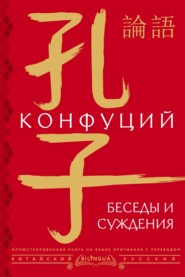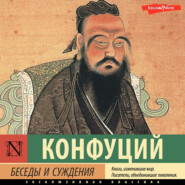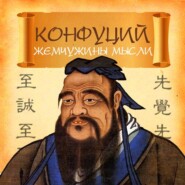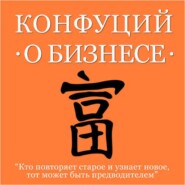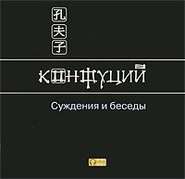По всем вопросам обращайтесь на: info@litportal.ru
(©) 2003-2024.
✖
Chinese Literature
Автор
Год написания книги
2018
Настройки чтения
Размер шрифта
Высота строк
Поля
Alluding to the matter of the Chief of the Ki family worshipping on Tai-shan,[7 - One of the five sacred mountains, worshipped upon only by the sovereign.] the Master said to Yen Yu, "Cannot you save him from this?" He replied, "It is beyond my power." "Alas, alas!" exclaimed the Master, "are we to say that the spirits of T'ai-shan have not as much discernment as Lin Fang?"
Of "the superior man," the Master observed, "In him there is no contentiousness. Say even that he does certainly contend with others, as in archery competitions; yet mark, in that case, how courteously he will bow and go up for the forfeit-cup, and come down again and give it to his competitor. In his very contest he is still the superior man."
Tsz-hiá once inquired what inference might be drawn from the lines—
"Dimples playing in witching smile,
Beautiful eyes, so dark, so bright!
Oh, and her face may be thought the while
Colored by art, red rose on white!"
"Coloring," replied the Master, "requires a pure and clear background." "Then," said the other, "rules of ceremony require to have a background!" "Ah!" exclaimed the Master, "you are the man to catch the drift of my thought. Such as you may well introduce a discussion on the Odes."
Said the Master, "As regards the ceremonial adopted and enforced by the Hiá dynasty, I am able to describe it, although their own descendants in the State of Ki can adduce no adequate testimony in favor of its use there. So, too, I am able to describe the ceremonial of the Yin dynasty, although no more can the Sung people show sufficient reason for its continuance amongst themselves. And why cannot they do so? Because they have not documents enough, nor men learned enough. If only they had such, I could refer them to them in support of their usages.
"When I am present at the great quinquennial sacrifice to the manes of the royal ancestors," the Master said, "from the pouring-out of the oblation onwards, I have no heart to look on."
Some one asked what was the purport of this great sacrifice, and the Master replied, "I cannot tell. The position in the empire of him who could tell you is as evident as when you look at this"—pointing to the palm of his hand.
When he offered sacrifices to his ancestors, he used to act as if they were present before him. In offering to other spirits it was the same.
He would say, "If I do not myself take part in my offerings, it is all the same as if I did not offer them."
Wang-sun Kiá asked him once, "What says the proverb, 'Better to court favor in the kitchen than in the drawing-room'?" The Master replied, "Nay, better say, He who has sinned against Heaven has none other to whom prayer may be addressed."
Of the Chow dynasty the Master remarked, "It looks back upon two other dynasties; and what a rich possession it has in its records of those times! I follow Chow!"
On his first entry into the grand temple, he inquired about every matter connected with its usages. Some one thereupon remarked, "Who says that the son of the man of Tsou[8 - Tsou was Confucius's birthplace; his father was governor of the town.] understands about ceremonial? On entering the grand temple he inquired about everything." This remark coming to the Master's ears, he said, "What I did is part of the ceremonial!"
"In archery," he said, "the great point to be observed is not simply the perforation of the leather; for men have not all the same strength. That was the fashion in the olden days."
Once, seeing that his disciple Tsz-kung was desirous that the ceremonial observance of offering a sheep at the new moon might be dispensed with, the Master said, "Ah! you grudge the loss of the sheep; I grudge the loss of the ceremony."
"To serve one's ruler nowadays," he remarked, "fully complying with the Rules of Propriety, is regarded by others as toadyism!"
When Duke Ting questioned him as to how a prince should deal with his ministers, and how they in turn should serve their prince, Confucius said in reply, "In dealing with his ministers a prince should observe the proprieties; in serving his prince a minister should observe the duty of loyalty."
Referring to the First of the Odes, he remarked that it was mirthful without being lewd, and sad also without being painful.
Duke Ngai asked the disciple Tsai Wo respecting the places for sacrificing to the Earth. The latter replied, "The Family of the Great Yu, of the Hiá dynasty, chose a place of pine trees; the Yin founders chose cypresses; and the Chow founders chestnut trees, solemn and majestic, to inspire, 'tis said, the people with feelings of awe."
The Master on hearing of this exclaimed, "Never an allusion to things that have been enacted in the past! Never a remonstrance against what is now going on! He has gone away without a word of censure."
The Master once said of Kwan Chung,[9 - A renowned statesman who flourished about two hundred years before Confucius's time. A philosophical work on law and government, said to have been written by him, is still extant. He was regarded as a sage by the people, but he lacked, in Confucius's eyes, the one thing needful—propriety.] "A small-minded man indeed!"
"Was he miserly?" some one asked.
"Miserly, indeed!" said he; "not thathe married three rimes, and he was not a man who restricted his official business to too few hands—how could he be miserly?"
"He knew the Rules of Propriety, I suppose?"
"Judge:—Seeing that the feudal lords planted a screen at their gates, he too would have one at his! Seeing that when any two of the feudal lords met in friendly conclave they had an earthenware stand on which to place their inverted cups after drinking, he must have the same! If he knew the Rules of Propriety, who is there that does not know them?"
In a discourse to the Chief Preceptor of Music at the court of Lu, the Master said, "Music is an intelligible thing. When you begin a performance, let all the various instruments produce as it were one sound (inharmonious); then, as you go on, bring out the harmony fully, distinctly, and with uninterrupted flow, unto the end."
The warden of the border-town of I requested an interview with Confucius, and said, "When great men have come here, I have never yet failed to obtain a sight of them." The followers introduced him; and, on leaving, he said to them, "Sirs, why grieve at his loss of office? The empire has for long been without good government; and Heaven is about to use your master as its edict-announcer."
Comparing the music of the emperor Shun with the music of King Wu, the Master said, "That of Shun is beautiful throughout, and also good throughout. That of Wu is all of it beautiful, but scarcely all of it good."
"High station," said the Master, "occupied by men who have no large and generous heart; ceremonial performed with no reverence; duties of mourning engaging the attention, where there is absence of sorrow;—how should I look on, where this is the state of things?"
BOOK IV
Social Virtue—Superior and Inferior Man
Sayings of the Master:—
"It is social good feeling that gives charm to a neighborhood. And where is the wisdom of those who choose an abode where it does not abide?
"Those who are without it cannot abide long, either in straitened or in happy circumstances. Those who possess it find contentment in it. Those who are wise go after it as men go after gain.
"Only they in whom it exists can have right likings and dislikings for others.
"Where the will is set upon it, there will be no room for malpractices.
"Riches and honor are what men desire; but if they arrive at them by improper ways, they should not continue to hold them. Poverty and low estate are what men dislike; but if they arrive at such a condition by improper ways, they should not refuse it.
"If the 'superior man' make nought of social good feeling, how shall he fully bear that name?
"Not even whilst he eats his meal will the 'superior man' forget what he owes to his fellow-men. Even in hurried leave-takings, even in moments of frantic confusion, he keeps true to this virtue.
"I have not yet seen a lover of philanthropy, nor a hater of misanthropy—such, that the former did not take occasion to magnify that virtue in himself, and that the latter, in his positive practice of philanthropy, did not, at times, allow in his presence something savoring of misanthropy.
"Say you, is there any one who is able for one whole day to apply the energy of his mind to this virtue? Well, I have not seen any one whose energy was not equal to it. It may be there are such, but I have never met with them.
"The faults of individuals are peculiar to their particular class and surroundings; and it is by observing their faults that one comes to understand the condition of their good feelings towards their fellows.
"One may hear the right way in the morning, and at evening die.
"The scholar who is intent upon learning the right way, and who is yet ashamed of poor attire and poor food, is not worthy of being discoursed with.
"The masterly man's attitude to the world is not exclusively this or thatwhatsoever is right, to that he will be a party.
"The masterly man has an eye to virtue, the common man, to earthly things; the former has an eye to penalties for error—the latter, to favor.
"Where there is habitual going after gain, there is much ill-will.
"When there is ability in a ruler to govern a country by adhering to the Rules of Propriety, and by kindly condescension, what is wanted more? Where the ability to govern thus is wanting, what has such a ruler to do with the Rules of Propriety?






